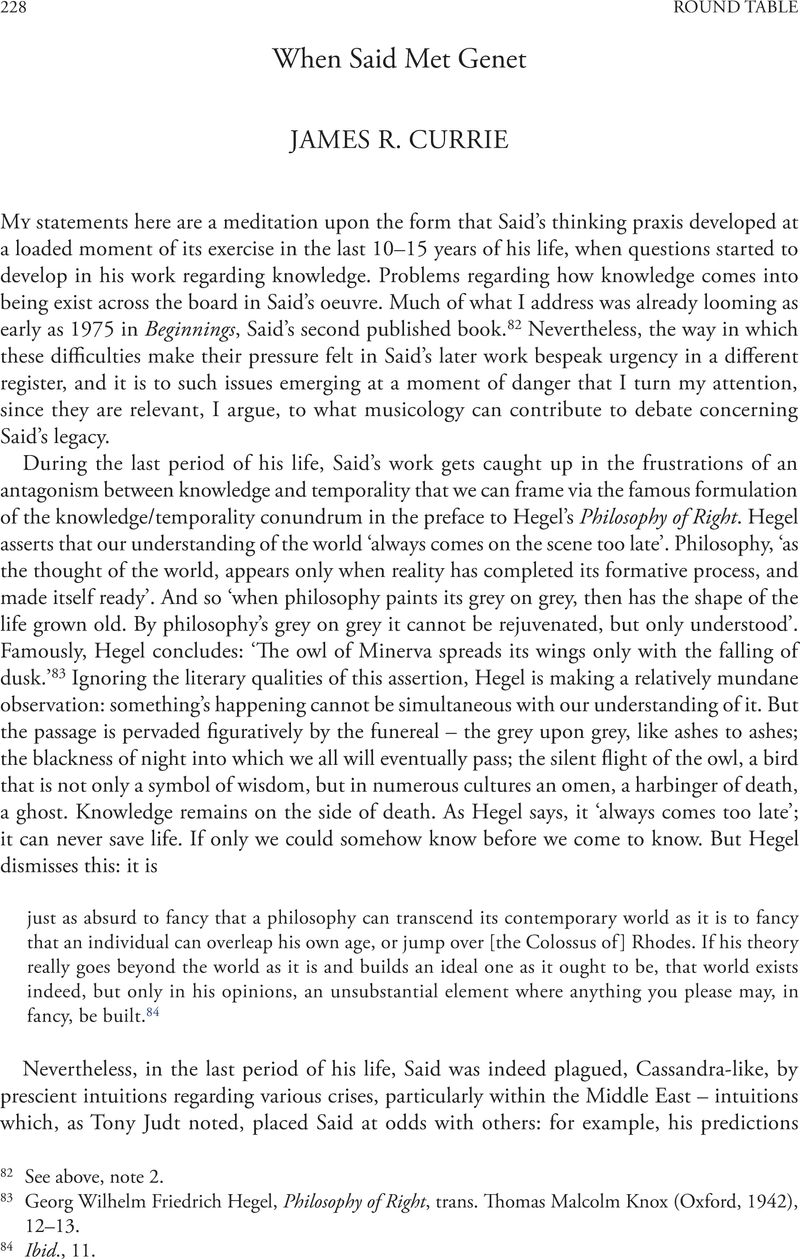No CrossRef data available.

82 See above, note 2.
83 Georg Wilhelm Friedrich Hegel, Philosophy of Right, trans. Thomas Malcolm Knox (Oxford, 1942), 12–13.
84 Ibid., 11.
85 Tony Judt, ‘Edward Said: The Rootless Cosmopolitan’, The Nation, 19 July 2004. The quotation is taken from the reprint of the essay in Tony Judt, Reappraisals: Reflections on the Forgotten Twentieth Century (New York, 2008), 163–78 (p. 168). Judt's essay was originally written as an introduction to Said's posthumous collection of essays From Oslo to Iraq and the Road Map (New York, 2007).
86 Edward Said, ‘Memory, Inequality, and Power: Palestine and the Universality of Human Rights’, given in February 2003 at the Center for Middle Eastern Studies at the University of California Berkeley. This quotation is my own transcription from the video footage, taken from <www.youtube.com/watch?v=Pb2pYStv8×8> (accessed 3 December 2014). A version of the talk also appears in Alif: Journal of Comparative Poetics, 24 (2004), 15–33.
87 I have argued elsewhere that in his later work Said allowed his normative modes of knowledge-making, and the ethics and politics attendant upon them, to become infected by what I have termed (with a distinctive nod towards Nietzsche) forgetting. See James R. Currie, Music and the Politics of Negation (Bloomington, IN, 2012), Chapter 5, ‘Forgetting (Edward Said)’, 139–77; and idem, ‘Another Music, a Time to Forget: Reflections on Edward Said's Late Style’, Contemporary Music Review, 31 (2012), 507–19, repr. in Music in Contemporary Philosophy, ed. Martin Scherzinger (London and New York, 2015), 163–76. This piece supplements my earlier work on Said's late style with the following proposition: that one of the possibilities made available by the forms of forgetting activated by art and, in particular, musical performance is the ability to predict the future.
88 Walter Benjamin, ‘Theses on the Philosophy of History’, Illuminations: Essays and Reflections, ed. with an introduction by Hannah Arendt, trans. Harry Zhon (New York, 1968), 253–64 (p. 255).
89 The essay (‘On Jean Genet's Late Works’) first appeared in the New York literary magazine Grand Street in 1990, and was later included in the posthumously published On Late Style: Music and Literature against the Grain (New York, 2006), 73–89, three years after Said's death.
90 Ibid., 74.
91 Ibid., 76.
92 ‘Artistic productivity is the capacity for being voluntarily involuntary.’ Theodor W. Adorno, Minima moralia: Reflections from Damaged Life, trans. E. F. N. Jephcott (New York, 1978), 222.
93 Said would quickly break an association with a thinker if he thought (as in the case of his early employment of the work of Michel Foucault) it was starting to turn into a form of identification by which he would be recognized by others. However, as many commentators have noted, Said's relationship with Adorno in the last 15 years was flagrantly (even performatively) identificatory. Famously, in an interview published in Ha-aretz in 2000, for example, Said claimed that he was ‘the only true follower of Adorno’. Edward W. Said, ‘My Right of Return’, repr. in Power, Politics, and Culture: Interviews with Edward W. Said, ed. Gauri Viswanathan (New York, 2002), 443–58 (p. 458). For a sensitive introduction to the question of Adorno's import to Said's later intellectual projects, see Moustafa Bayoumi, ‘Reconciliation without Duress: Said, Adorno, and the Autonomous Intellectual’, Alif: Journal of Comparative Poetics, 25 (2005), 46–64.
94 Said, On Late Style, 77.
95 See above, note 87.